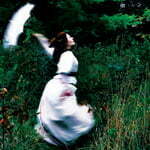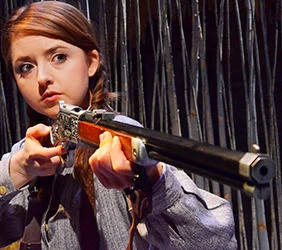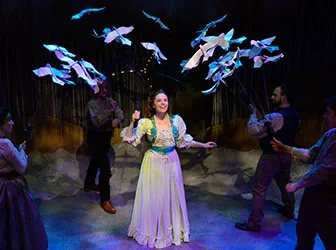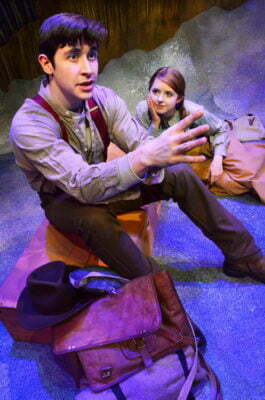One Came Home

Adapted by Jessica Wright Buha
From the novel by Amy Timberlake
Directed by Elise Kauzlaric
Produced by Lifeline Theatre
Murder Mystery Appeals to All Ages
As a theatre committed to adaptations, mostly of literature, Lifeline’s company should be experts on storytelling. Now in their thirty-second year, the company does shows for both children and older audiences. Their latest production, however, of Amy Timberlake’s Newbery honored novel One Came Home, is at the right level to be interesting to people of all ages except the very young. The story of a teenage girl in the nineteenth century embarking on a quest with an older male companion has drawn comparisons to True Grit, and like those movies, the play works just as well for adults on a night out as for families.
Georgie Burkhardt (Ashley Darger) is a tomboy who lives in a small town in Wisconsin in 1871 with her mother, grandfather, and older sister Agatha (Amanda Jane Long). While Georgie enjoys hunting and the outdoors, Agatha loves literature and would much rather attend the University of Wisconsin than become a homesteader’s wife. Nonetheless, she and Georgie have a close bond, so Georgie is jealous of Agatha’s romantic entanglements. Agatha had been seeing a boy named Bill McCabe(Jeff Kurysz), who she likes, but who wants to start a farm in Minnesota and is seriously involved with another girl who doesn’t mind the rural life. At the same time, she’s seeing an hotelier named Mr. Olmstead (Dan Granata), who she doesn’t really like, but orders whatever books she requests. We learn most of this through flashbacks, and though we don’t learn until later exactly what prompts Agatha to leave town, we do know she sneaks out with nomadic hunters pursuing a flock of passenger pigeons, while wearing her beloved blue-green ball gown. Two weeks later, a young woman is found on the same trail, in the same ball gown, with a bullet through her face.
Though the body is in terrible condition, only Georgie doubts that it’s really her sister. There’s no rational justification for this, but though plucky, Georgie refuses to accept death, and has reason to feel guilt over Agatha’s departure. Seeing Billy’s distress at Agatha’s grave and hoping to find him sympathetic, she bargains with him for a horse so she can launch her own investigation. He gives her a mule, and insists on accompanying her. As they travel together, they squabble, but come to like each other better as they learn of each other’s talents. A big point of tension is that Billy informed Georgie’s family they would be going, which rather spoils the adventure for her. He’s smart and protective, and probably humoring her out of fondness for Agatha and his own sense of guilt over her departure. However, one contingency he failed to plan for was that they might actually stumble across the murderers…
As Georgie, Ashley Darger is a bull-headed formalistic young lady who never heard of compromise or contractions. However, the key difference between her and True Grit’s Mattie Ross is that she does not see herself as an avenger, truly not believing Agatha to be dead, and has a more complex relationship with killing things. Darger does a good job of letting Georgie mature into a true hero and retaining some human vulnerabilities. Jeff Kurysz’s Bill is just as hard-working, but more easy-going and has a sense of humor. It’s easy to see why so many girls like him, and he bonds with Georgie by explaining why he’s so good at courting. The supporting cast, who also play instruments, drop in as memorable characters as the story requires. Errol McLendon as the grandfather supplies the protestant ethic and skepticism of education that informs so much of Georgie’s character and that Agatha chafes against. It’s so important that McLendon makes him likable, because we understand the girls sneak off out of a desire to spare everyone the pain of a confrontation.
Elize Kauzlaric’s simple staging allows our imaginations to fully engage with the play. The horse and mule are represented as ladders, which the actors are talented enough to pull off riding. Scenic designer Alan Donahue supplied wooden poles that suggest a forest, and an orange sky that could reference the wave of firestorms in 1871. He also supplied passenger pigeon puppets that create an ironically glum atmosphere, since the significance of the last great flock is lost on the characters. Costume designer Aly Renee Amidei made rough working clothes for the settlers, contrasting all the more with Agatha’s fondness for soft, flashy dresses. John Szymanski’s music, which mostly covers time shifts, contributes the folksy atmosphere without overwhelming or distracting from the drama.
While the story belongs in the western genre, it is entertaining in its own right, and has a somewhat different moral perspective. The subject matter is grim, but the cast makes One Came Home a lively experience, and the audience remained interested throughout the performance in seeing what would happen next. Though the original novel seems aimed at a middle school audience, I saw many adults enjoying the performance, which is probably why the marketers have pushed the True Grit comparisons. Buha’s adaptation is well-paced, balancing action, suspense, and character development. The bottom line is One Came Home is a well told story, and a fun night out at the theatre.
Highly Recommended
Jacob Davis
Reviewed February 23, 2015
For more information, see One Came Home’s page on Theatre in Chicago.
Playing at Lifeline Theatre, 6912 N. Glenwood Ave. For tickets, call 773-761-4477 or visit www.lifelinetheatre.com. Tickets are $40 with discounts for seniors, students, and rush tickets available. Plays Thursdays and Fridays at 7:30 pm, Saturdays at 4:00 and 8:00 pm, and Sundays at 4:00 pm. Plays through April 5. Running time is two hours and ten minutes with one intermission.



